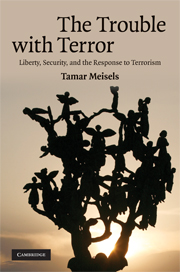3 - How terrorism upsets liberty
Published online by Cambridge University Press: 04 August 2010
Summary
As terrorism increasingly penetrates Western democracies, liberals and libertarians are obliged to ask themselves whether contending with it justifies restricting civil liberty and, if so, to what extent. Neither personal security nor individual liberty is ever fully realized – both are a matter of degree – and they are often perceived as being at odds with each other. Hence it has been suggested that we reconsider the existing trade-off between them, or reassess their “rate of exchange.” While such questions are sometimes raised by left-leaning liberals, they are in fact particularly acute for liberals on the right, or libertarians, who would normally resist any increase in government intervention. Right-wingers who advocate “hands off” policies on all other occasions now call for an increase in government intervention as regards security measures. Many left-liberals, on the other hand, are reluctant to concede any further power to the state in order to combat terrorism.
This chapter explores the issue of whether increased terrorist threats require a diminution in liberty rights as the price of security. In the US, many of the aggressive measures against terrorism taken by the Bush administration since September 11, such as the Patriot Act and the more recent Military Commissions Act (2006), have stirred considerable debate about striking a new balance between security and liberty. I set out by discussing Jeremy Waldron's analysis of the concept of security, and his reservations about this notion of striking a new balance between security and liberty.
- Type
- Chapter
- Information
- The Trouble with TerrorLiberty, Security and the Response to Terrorism, pp. 57 - 89Publisher: Cambridge University PressPrint publication year: 2008



